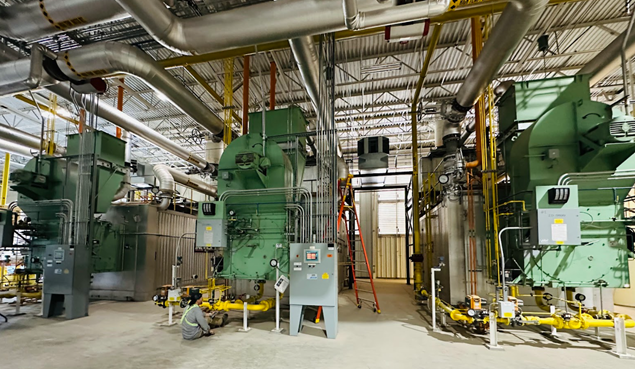
Meet the Powerhouse: What Industrial Boilers Do Every Day
You might not think about them much, but industrial boilers are the unseen engines behind many systems we rely on. They generate the heat and steam that drive production, heat buildings, and keep things running smoothly. From manufacturing lines to food processing and hospitals, boilers are critical. This article will walk you through what they are, how they work, and where you’ll find them working around the clock.
So, What Is an Industrial Boiler? Let’s Break It Down
An industrial boiler is a sophisticated system designed to convert fuel into thermal energy — typically in the form of steam or hot water. This energy is then distributed throughout facilities to support operations ranging from space heating to process applications. These machines vary in size, fuel type, and design, but their core function is consistent: delivering dependable, high-output heat. Boilers are often customized to fit the specific needs of a facility, making them incredibly versatile and mission-critical.
Behind the Heat: How Boilers Actually Work
At a fundamental level, industrial boilers apply the principles of thermodynamics to generate steam. Heat is produced through combustion, which transfers energy to water contained in either fire-tube or water-tube systems. In fire-tube boilers, hot gases flow through tubes surrounded by water; in water-tube boilers, water flows through heated tubes. Each configuration has specific strengths — water-tube systems are favored in high-pressure, high-demand environments, while fire-tube units are ideal for lower pressure, steady-load operations. The generated steam is then used to drive processes, warm spaces, or power equipment.
Where You’ll Find Them: Real-World Uses That Might Surprise You
Big Buildings, Bigger Heating Needs: Boilers in Facilities
In places like hospitals, universities, and massive commercial campuses, boilers handle both space heating and domestic hot water. Many large cities — like New York — rely on centralized steam systems powered by industrial-grade boilers to keep entire neighborhoods warm. In hospitals, boilers also serve sterilization equipment and critical environmental controls. These systems are designed for redundancy and efficiency, supporting patient care, sanitation, and climate control all at once.
The Backbone of Manufacturing: Keeping Plants Productive
Boilers are essential in industrial environments where heat and steam are needed for production, chemical reactions, or machinery. Take a steel mill, for example — boilers provide the energy for annealing and cleaning. In automotive plants, steam powers paint booths and pressurization systems. Their reliability and energy density make boilers invaluable for maintaining uptime and consistency in operations.
From Grain to Glass: Boilers in Food & Beverage
Steam is a non-negotiable element in modern food production. Breweries use it to control mash temperature; dairy plants rely on it for pasteurization. Even packaged food companies use steam for sterilizing cans and prepping production lines. Without boiler systems, food safety, consistency, and large-scale output would be impossible.
Saving Lives and Running 24/7: Healthcare Boiler Applications
Boilers in medical settings have to meet incredibly strict performance and safety standards. They power autoclaves for sterilization, humidify air systems, and provide heat and hot water to patient wings, surgical suites, and laboratories. With zero margin for error, these boilers are often equipped with backup fuel systems, continuous monitoring, and compliance mechanisms aligned with state and federal codes.
Clean, Pressed, and Professional: Steam in Laundry and Textile Ops
Whether it’s a textile mill dyeing fabric or a commercial laundry processing thousands of pounds daily, boilers are key to efficiency. High-temperature steam removes wrinkles, sanitizes linens, and sets dyes in fabric processing. These systems are engineered for high output and constant operation, especially in operations like hotels, hospitals, and uniform providers.
Choosing the Right Tool: Different Types of Boilers Explained
Industrial boilers come in several configurations, each suited to specific environments. Fire-tube boilers are compact and user-friendly, making them suitable for steady-load facilities like schools and small manufacturing plants. Water-tube boilers, on the other hand, are built for high-pressure and high-temperature applications — ideal for power plants and process-heavy industries. You’ll also find electric boilers, waste-heat recovery systems, and biomass-fueled units in operations focused on sustainability. Each type offers unique advantages in terms of cost, footprint, and efficiency.
No Shortcuts Here: Why Maintenance & Safety Are Non-Negotiable
Boiler systems are complex and high-stakes — a minor issue can escalate quickly without proper care. That’s why routine inspections, water treatment, combustion analysis, and system testing are essential. Built-in safety mechanisms like pressure relief valves, flame detection, and auto shutoffs are your last lines of defense, not your first. Operator training and regulatory compliance (e.g., ASME, NFPA, and OSHA standards) are mandatory in most jurisdictions. When maintained properly, boilers can last decades and operate at peak performance year-round.
Thinking Green: Efficiency & Environmental Performance
As industries strive to reduce emissions and lower fuel costs, modern boiler systems have evolved. High-efficiency condensing boilers, low-NOx burners, and real-time monitoring systems are helping companies stay compliant with environmental standards. Some operations are transitioning to electric or biomass-fueled boilers to reduce dependence on fossil fuels. Smart upgrades not only reduce carbon footprints — they often pay off quickly through energy savings, tax incentives, or operational reliability.
The Takeaway: A Silent Giant Powering the Everyday
Industrial boilers may be tucked away in basements or boiler rooms, but their role is anything but small. They’re responsible for heat, energy, safety, and productivity across a wide range of industries. With the right setup and proper maintenance, a boiler system becomes a highly efficient and reliable asset. Whether you’re managing a facility, designing a plant, or just curious about how things work, understanding boilers gives you insight into the systems that make modern life possible. And now, you’re one step closer to being the person who actually knows what that big steel machine in the mechanical room is for.
